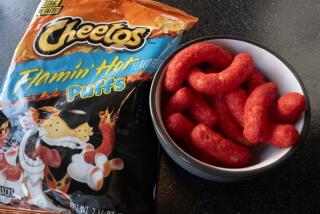Tomato king Frederick Scott Salyer’s journey from boardroom to jail cell
- Share via
Scott Salyer stepped into the federal courtroom in Sacramento, his trim frame swimming in an orange prisoner jumpsuit, his legs shackled, his wrists restrained.
It was a humiliating moment in February for the 54-year-old agribusiness mogul, the last prince of one of California’s cotton farming dynasties. The tomato processing outfit he started with his father, Fred Salyer, was in bankruptcy. Scott was being blamed for running SK Foods into the ground — and far worse.
Salyer clenched his jaw as the prosecutor reeled off the allegations: that he and SK Foods tricked supermarkets and big food companies into buying substandard tomato products to put into brands found in almost every American cupboard.
Scott and SK Foods, the government said, conspired to inflate prices on millions of pounds of processed tomatoes sold to 55 companies in 22 states. It was an alleged scheme that ripped off consumers and reaped big profits for Salyer.
Behind him, in the crowded spectator seats, attorneys for angry creditors slapped high-fives. Fred, 86, was not there. Neither was any of the rest of the Salyer clan.
From humble Southern roots, the Salyers became one of the most powerful agricultural families in the West. And Scott’s legal woes are rooted in a litigious family tradition.
For three generations, the Salyers fought one another in court to control multimillion-dollar corporations and, at its peak, oversaw a land empire three times the size of San Francisco. Yet the dynasty ultimately couldn’t withstand the infighting, particularly the falling-out between Scott and Fred.
Fred declined to be interviewed for this story. So did Scott, who pleaded not guilty in May to 12 counts of corruption, including racketeering, wire fraud, obstruction of justice and violating federal antitrust laws. He remains in jail because he can’t make his $6.3-million bail.
It’s the latest chapter in a family saga that’s unfolding through court documents, public records and interviews with colleagues, former workers and others.
No one has suggested Fred is complicit in the tomato debacle. If anything, investigators say, the real trouble started after he left.
Long before produce tore the family apart, the Salyers were known as one of the best cotton growers in the Central Valley. From the family’s dusty ranch home in Corcoran, about 50 miles south of Fresno, they snapped up marginal land with access to water and pushed it to yield crops. Their cotton gins cranked out fibers used in products as varied as car tires and designer T-shirts.
Along with his brother Everette, Fred ran the business that their father built from nothing. Fred was a farmer’s farmer, a tall, balding and bespectacled man who spent more time in the fields than behind a desk. A child of the Great Depression, he possessed frugal sensibilities that shaped his views from national politics to family affairs.
Scott was born Frederick Scott Salyer. He grew into an outgoing man with a movie-star smile and a penchant for racing cars and flying planes.
After Scott came home to Corcoran in 1977 with a degree in agribusiness from Cal Poly San Luis Obispo, Fred groomed him to take over the family business. At school, Scott had learned that success was achieved through growth, and growth came by leveraging what you own to borrow money.
By the early 1980s, Scott took the lead at Salyer American.
“There’s an old saying: You give a horse its head,” said Thomas Foley Jr., Fred’s attorney. “Fred gave Scott his head.”
Scott borrowed money from banks, using the family farmland as collateral, Foley said. Costs mounted as floods battered the Central Valley and oversupply sent cotton prices plummeting.
Fred tried to step back in, Foley said, but by 1987, Salyer American was more than $100 million in debt. Father and son turned over more than half of the family’s farmland — 40,000 acres — to its main lender, Bank of America, to clear the debt.
Tensions grew. A business consultant was hired to be a buffer between Fred and Scott. Together, they agreed to get into the tomato business.
The plan started simply: Grow tomatoes on Salyer land, broker deals with other farmers to ensure plenty of supply, and build factories to process it all.
By the summer of 1990, the first SK Foods plant was running in Lemoore, Calif., said Richard Jennings, a former president of SK Foods. “We only used the best produce and the best equipment,” Jennings said.
But, he added, “Scott was always asking, ‘Why are we going to all this trouble? Who’s going to know the difference?’”
The strain between Fred and Scott continued. At board meetings, Scott would scream and belittle anyone who disagreed with him, Jennings said, while Fred would stew quietly.
Scott wanted to run SK Foods, so he bought out his family’s interest in 1996, Foley said. But he still had ties to Salyer American Fresh Foods, the family’s produce-growing and -selling firm.
By the early 1990s, production costs were mounting once again. Father and son fought over how quickly to grow the various businesses. In 1995, Fred contacted boyhood friend and longtime rival James G. Boswell II and asked him to buy the majority of the family’s farmland. Boswell agreed.
Years passed and the family feud roiled. In 1998, Scott took Fred, his mother, Marian, and his sister Linda Salyer Lee to court to force the dissolution of Salyer American Fresh Foods.
He accused Fred and Linda of trying to oust him and called his father selfish, according to a complaint filed in Monterey County Superior Court. His father and sister countersued, accusing Scott of using at least $833,000 in corporate funds for personal use, including a 10th-wedding-anniversary party.
“As a result of Fred’s belief that Scott had misappropriated funds … he continually referred to Scott as a ‘liar and thief.’ Scott referred to Fred as ‘dumb’ or a ‘stupid old man,’ ” according to a 2000 court filing submitted by Scott’s then-attorney, Charles G. Warner.
Judge Richard M. Silver ordered that Scott be reinstated as treasurer but denied his bid to involuntarily dissolve Salyer American Fresh Foods. The same judge, Foley said, later ordered the Salyers to record their meetings to try to keep the peace.
The legal wrangling continued, however, and in 2005, Scott filed suit in federal court in San Jose accusing his father and sister of racketeering, fraudulent accounting practices and demonstrating “unrelenting hostility.” When Scott was fired — again — he said they called the local sheriff’s department to kick him out of a board meeting, according to court documents.
The federal case was dismissed in 2007, as part of a settlement: Scott bought Fred and Linda out of the business for an undisclosed sum.
By then, the FBI was well underway in its probe of Scott and SK Foods. Investigators called it Operation Rotten Tomato.
It started with a tip the FBI got in 2005 from Morning Star Co., the nation’s largest tomato packer: Former executive Anthony Ray Manuel, it was alleged, had embezzled money from the Woodland, Calif., firm.
The FBI raided Manuel’s home. According to court documents, Manuel told investigators that the corruption happening at his then-current employer — SK Foods — was far worse. Manuel agreed to wear a wire in exchange for consideration during his sentencing. (Manuel, 58, later pleaded guilty to embezzling $975,000 from Morning Star. He could not be reached for comment.)
Investigators also obtained court orders for wiretaps on a company broker’s phones. In the spring of 2008, federal agents raided SK Foods’ offices in Monterey, Scott’s $6-million mansion in Pebble Beach and several other locations.
What they found, prosecutors say, was that SK Foods was having trouble keeping up with demand. When the firm ran short of the tomato paste customers wanted, Scott had employees relabel poorer-quality tomatoes to fill the order, the government said.
SK Foods sold its customers organic paste that wasn’t organic, changed production dates to make the product seem fresher than it was and altered quality-control documents to hawk paste with mold content that was higher than levels permitted by the FDA, according to court documents.
“You can solve all your problems with a label printer,” Scott told Glen McClaran, a former SK Foods president, in 2007, according to court documents.
To ensure that the companies would buy SK Foods’ tomato paste, Scott allegedly directed his subordinates to bribe purchasing managers to make sure the inflated deals were signed.
By the time creditors forced SK Foods into bankruptcy protection in May 2009, the banks alone were owed about $195 million. Bankruptcy trustee Bradley D. Sharp said he discovered that SK Foods funds were used to buy a $1.5-million lot in Maui and a $2.6-million Lake Tahoe condo and to operate a $1.5-million jet, among other things.
The Bankruptcy Court found there was evidence that, after federal agents raided Scott’s home, he liquidated business assets worth $3 million to $7 million and transferred the money to overseas banks, according to court documents. Then last year, he left the country and went to Europe.
On Feb. 4, Scott flew back to the U.S. to meet with Sharp about the SK Foods bankruptcy. FBI agents arrested him at John F. Kennedy International Airport.
Eleven people have been charged in connection with the SK Foods case. All but Scott have pleaded guilty.
SK Foods’ plants were sold for $39 million to a Singapore firm. Salyer American Fresh Foods, which was debt-free when Scott bought it, is now in receivership.
Scott sits in a solitary cell on the Sacramento County Main Jail’s seventh floor, awaiting trial. Back in Corcoran, Fred lives on the same ranch where Scott grew up. He has not visited his son.
More to Read
Inside the business of entertainment
The Wide Shot brings you news, analysis and insights on everything from streaming wars to production — and what it all means for the future.
You may occasionally receive promotional content from the Los Angeles Times.










